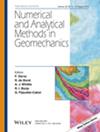Intelligent Inversion of Multi‐Stratum Parameters in Shield Tunnels and Reliability Analysis of Tunnel Deformation Under Spatial Variability Conditions
IF 3.6
2区 工程技术
Q2 ENGINEERING, GEOLOGICAL
International Journal for Numerical and Analytical Methods in Geomechanics
Pub Date : 2025-10-01
DOI:10.1002/nag.70094
引用次数: 0
Abstract
Owing to deposition, weathering, and historical loading variations, the mechanical properties of underground rock and soil masses demonstrate significant spatial variability and stratified distribution. This study investigates the influence of multi‐layer soil spatial variability on ground settlement and tunnel reliability during shield tunnel construction by developing a refined stochastic finite element model. The CPSO‐TLOOA‐Stacking hybrid intelligent algorithm optimizes the inversion of multi‐stratum mechanical parameters based on the measured surface settlement data from tunnel engineering and the Conditional Tabular GAN (CTGAN) data extension framework. Utilizing the Karhunen–Loève (K‐L) series expansion method and random field theory, a joint analysis framework of stochastic finite element and probability statistics is constructed to evaluate the impact of spatial random field parameters of different soil layers on formation deformation and failure probability. Coupled with the Hamiltonian Monte Carlo‐Subset Simulation algorithm, the reliability of tunnel deformation under conditions of cross‐correlated random fields with multiple surrounding rock parameters is effectively assessed. The results indicate that the盾构隧道多地层参数智能反演及空间变异性条件下隧道变形可靠性分析
由于沉积、风化和历史荷载的变化,地下岩土体的力学特性表现出显著的空间变异性和分层分布。本文通过建立改进的随机有限元模型,研究了盾构隧道施工过程中多层土体空间变异性对地面沉降和隧道可靠性的影响。CPSO - TLOOA - Stacking混合智能算法基于隧道工程实测地表沉降数据和条件表GAN (CTGAN)数据扩展框架,优化了多层力学参数的反演。利用karhunen - lo (K‐L)级数展开法和随机场理论,构建随机有限元和概率统计的联合分析框架,评估不同土层空间随机场参数对地层变形和破坏概率的影响。结合哈密顿蒙特卡罗子集模拟算法,有效地评估了多围岩参数交叉相关随机场条件下隧道变形的可靠性。结果表明,CPSO - TLOOA - Stacking混合智能算法拟合的扩展数据集R2值为99.46%,与实测值的相对误差为0.7%。哈密顿蒙特卡罗子集模拟算法显著提高了隧道变形可靠性的计算效率,为盾构隧道施工和设计提供了有价值的指导。
本文章由计算机程序翻译,如有差异,请以英文原文为准。
求助全文
约1分钟内获得全文
求助全文
来源期刊
CiteScore
6.40
自引率
12.50%
发文量
160
审稿时长
9 months
期刊介绍:
The journal welcomes manuscripts that substantially contribute to the understanding of the complex mechanical behaviour of geomaterials (soils, rocks, concrete, ice, snow, and powders), through innovative experimental techniques, and/or through the development of novel numerical or hybrid experimental/numerical modelling concepts in geomechanics. Topics of interest include instabilities and localization, interface and surface phenomena, fracture and failure, multi-physics and other time-dependent phenomena, micromechanics and multi-scale methods, and inverse analysis and stochastic methods. Papers related to energy and environmental issues are particularly welcome. The illustration of the proposed methods and techniques to engineering problems is encouraged. However, manuscripts dealing with applications of existing methods, or proposing incremental improvements to existing methods – in particular marginal extensions of existing analytical solutions or numerical methods – will not be considered for review.

 求助内容:
求助内容: 应助结果提醒方式:
应助结果提醒方式:


